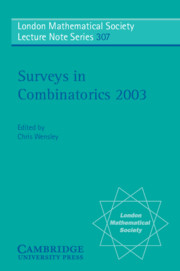Book contents
- Frontmatter
- Contents
- Preface
- W.T. Tutte, 1917–2002
- 1 Decompositions of complete graphs: embedding partial edge-colourings and the method of amalgamations
- 2 Combinatorial schemes for protecting digital content
- 3 Matroids and Coxeter groups
- 4 Defining sets in combinatorics: a survey
- 5 Finite projective planes with a large abelian group
- 6 Algorithmic aspects of graph homomorphisms
- 7 Counting lattice triangulations
- 8 Partition regular equations
- 9 Kostka–Foulkes polynomials and Macdonald spherical functions
8 - Partition regular equations
Published online by Cambridge University Press: 05 May 2013
- Frontmatter
- Contents
- Preface
- W.T. Tutte, 1917–2002
- 1 Decompositions of complete graphs: embedding partial edge-colourings and the method of amalgamations
- 2 Combinatorial schemes for protecting digital content
- 3 Matroids and Coxeter groups
- 4 Defining sets in combinatorics: a survey
- 5 Finite projective planes with a large abelian group
- 6 Algorithmic aspects of graph homomorphisms
- 7 Counting lattice triangulations
- 8 Partition regular equations
- 9 Kostka–Foulkes polynomials and Macdonald spherical functions
Summary
Abstract
A finite or infinite matrix A with rational entries is called partition regular if whenever the natural numbers are finitely coloured there is a monochromatic vector x with Ax = 0. Many of the classical theorems of Ramsey theory, such as van der Waerden's theorem or Schur's theorem, may naturally be interpreted as assertions that particular matrices are partition regular.
While in the finite case partition regularity is well understood, very little is known in the infinite case. In this survey paper we will review some finite results and then proceed to discuss some features of the infinite case.
Introduction
Let A be an m × n matrix with rational entries. We say that A is partition regular if for every finite colouring of the natural numbers ℕ = {1, 2,…} there is a monochromatic vector x ∈ ℕn with Ax = 0. In other words, A is partition regular if for every positive integer k, and every function c : ℕ → {1,…, k}, there is a vector x = (x1,…,xn) ∈ ℕn with c(x1) = … = c(xn) such that Ax = 0. We may also speak of the ‘system of equations Ax = 0’ being partition regular.
Many of the classical results of Ramsey theory may naturally be considered as statements about partition regularity. For example, Schur's theorem [11], that in any finite colouring of the natural numbers we may solve x+y = z in one colour class, is precisely the assertion that the 1×3 matrix (1,1, −1) is partition regular.
- Type
- Chapter
- Information
- Surveys in Combinatorics 2003 , pp. 309 - 324Publisher: Cambridge University PressPrint publication year: 2003



